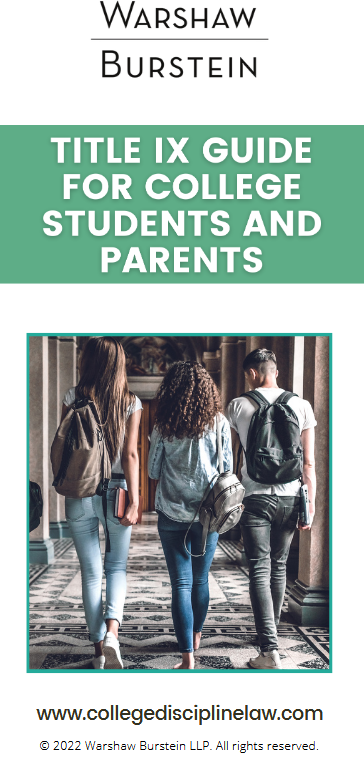-
Khan v. Yale Univ., 85 F.4th 86 (2d Cir. 2023)
12/07/2023
Applying Connecticut law, the Second Circuit held that Yale University’s disciplinary proceedings were not quasi-judicial and the Defendant was not entitled to absolute immunity for statements made during the disciplinary process.
-
Doe v. University of Connecticut, Docket No. 3:20cv92 (MPS), 2021 U.S. Dist. LEXIS 21267 (D. Conn. Feb. 4, 2021)
02/09/2021
After successfully petitioning for a TRO and reaching a settlement with UCONN that vacated the findings and sanctions against John Doe, and required UCONN to hold a new hearing with increased due process protections, Doe moved to recover attorney’s fees. The Court held that Doe was the prevailing party and awarded Doe a substantial portion of his requested attorney’s fees.
-
Khan v. Yale University, Docket No. 3:19-cv-01966 (KAD), 2021 U.S. Dist. LEXIS 2690 (D. Conn. Jan. 7, 2021)
01/12/2021
Plaintiff’s defamation and tortious interference claims against Jane Doe were dismissed. Court held that Yale’s University-Wide Committee on Sexual Misconduct proceedings were quasi-judicial and granted Doe absolute immunity for the allegedly defamatory statements she made at the hearing.
-
Doe No. 3 v. Montana State University, Docket No. CV-20-23-BU-BMM-JTJ, 2020 U.S. Dist. LEXIS 239799 (D. Mont. Dec. 21, 2020)
01/05/2021
Plaintiff Jane Doe survives Montana State University’s motion to dismiss. The Court held that the general pleading standard of FRCP Rule 9(b) applies to allegations of intent in Title IX cases. The Court also found sufficient allegations to support a finding of an official policy or custom of discrimination.
-
Rosenberg v. New York University, No. 160326/2020 (NY Sup. Ct. Dec. 7, 2020)
12/15/2020
Court denied Plaintiff’s motion for temporary restraining order. Plaintiff is an NYU student who was suspended for one semester for violating COVID-19 policy. Court held that Plaintiff did not face irreparable harm in the absence of a TRO, and that Plaintiff was unlikely to succeed on the merits.
-
Orr v. S.D. Bd. of Regents, No. 1:19-CV-01023, 2020 U.S. Dist. LEXIS 184210 (D.S.D. Oct. 5, 2020)
10/19/20
Defendant’s motion to dismiss for failure to state a claim upon which relief may be granted was denied, as the court found Title IX provides a private right of action for employees of covered institutions alleging intentional sex-based discrimination.
-
Doe v. Univ. of the Scis., 2020 U.S. Dist. LEXIS 158684 (E.D. Pa. Sep. 1, 2020)
09/08/20
Plaintiff’s motion for Temporary Restraining Order and Preliminary Injunction seeking reinstatement as a student and to enjoin the University of the Sciences from imposing any disciplinary sanctions against him was denied because Plaintiff failed to establish immediate, irreparable harm if an injunction was not granted.
-
Doe v. Edgewood Indep. Sch. Dist., No. 19-50737, 2020 WL 3634519 (5th Cir. July 6, 2020)
07/21/2020
Jane Doe was subjected to years of ongoing employee-on-student sexual misconduct. However, the misconduct never came to the attention of a staff member with the ability to institute corrective action. Without actual knowledge of the misconduct, Defendant school district could not be liable under Title IX. Furthermore, Plaintiff’s §1983 claims failed because Jane was unable to prove the requisite causal link between Defendant’s actions and the injury Jane suffered.
-
John Doe v. University of the Sciences, No. 19-2966 (3d Cir. 2020
06/03/2020
Third Circuit declines to follow the Second Circuit’s holding in Yusuf v. Vassar College and, instead, chooses not to impose doctrinal tests when pleading gender bias to support a Title IX cause of action. The Court also held that promises of fair and equitable treatment under the University of the Sciences policy were enforceable. The Third Circuit reversed the district court’s decision and held that John Doe stated a claim for both Title IX and breach of contract.
-
John Doe v. Washington & Lee University, 2020 WL 618836 (W.D. Va. Feb. 10, 2020)
02/25/2020
John Doe’s breach of contract claim was dismissed because Virginia law did not support finding an implied-in-law contract. Doe’s negligence claims were dismissed because no legal duty existed between student and university under Virginia law.
-
Doe v. University of Connecticut, No. 3:20CV92 (MPS) (D. Conn. Jan. 23, 2020).
02/11/2020
Court granted TRO allowing John Doe to return to class pending litigation of his motion for a preliminary injunction. John Doe was able to show under the heightened standard for a mandatory injunction that he was entitled to a TRO.
-
Mucaj v. University of Connecticut, No. 3:20cv66 (MPS) (D. Conn. Jan 16, 2020)
02/04/2020
TRO granted, preventing UCONN from proceeding with a disciplinary hearing against two students. Students were able to show proceeding with the disciplinary hearing would result in irreparable harm, the existence of sufficiently serious questions going to the merits to make them a fair ground for litigation, and a balance of hardships tipping decidedly in their favor.
-
John Doe v. Michigan State University, No. 1:19-cv-226 (W.D. Mich. Apr. 15, 2019)
06/04/2019
Court denied John Doe’s motion for a preliminary injunction because the interim suspension was temporary in nature, and Doe was afforded an opportunity to argue at a hearing why such a suspension was unnecessary.
-
Doe v. Princeton, 2019 U.S. Dist. LEXIS 4449 (D.N.J. 2019)
03/05/2019
Plaintiff John Doe brings suit against Princeton University for failure to postpone his Title IX interview until the proposed Title IX regulations take effect. After two postponements, Princeton scheduled the interview and John Doe filed a motion for preliminary injunction alleging four causes of action against Princeton. Although Plaintiff’s preliminary injunction was denied, his breach of contract claims were sustained. Whether Plaintiff’s extension request demonstrated “good cause” presents an issue of fact more appropriate for summary judgment.
-
Doe v. Amherst College, 238 F.Supp3d 195 (D. Mass.2017).
02/28/2018
Investigation failed to seek out exculpatory evidence.District Court denied school’s motion for judgment on the pleadings with regards to Doe’s allegations of insufficient evidence to find him responsible; an insufficient investigation; gender discrimination; erroneous outcome, selective enforcement, and deliberate indifference under Title IX.


